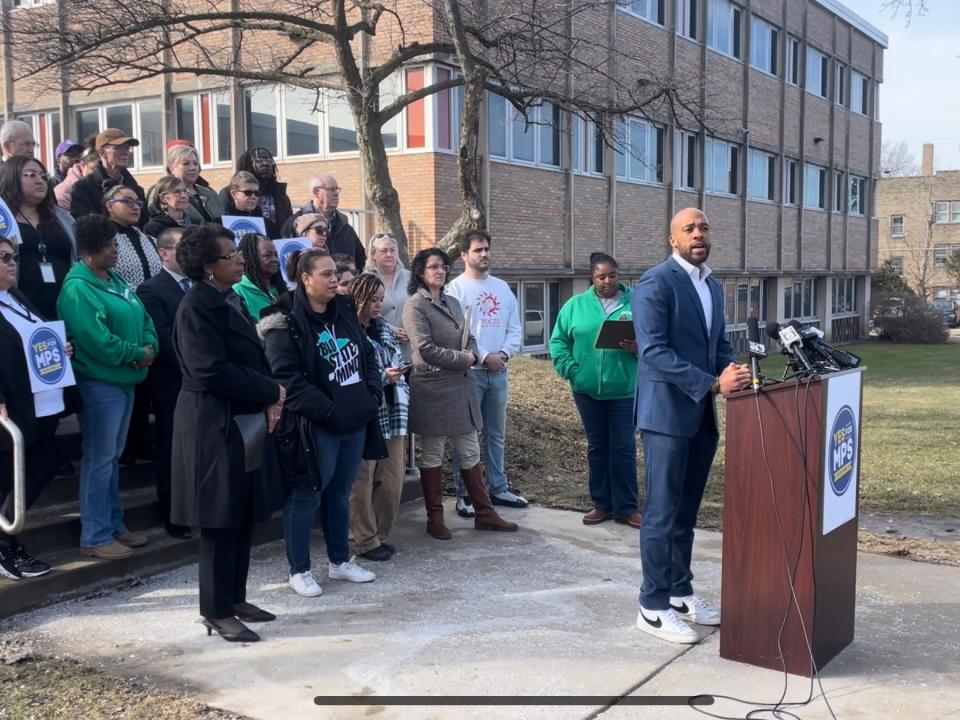Milwaukee attorney Dan Adams launches opposition to MPS referendum
In the voting booth April 2, Milwaukeeans will be asked whether they are willing to raise their property taxes to increase funding for Milwaukee Public Schools.
While top officials from former Lt. Gov. Mandela Barnes to Mayor Cavalier Johnson are drumming up support for the measure, there's a new face to the opposition: Milwaukee private defense attorney Daniel Adams.
Adams, who has a history of organizing political projects in Milwaukee as a self-identified Democrat and libertarian, said he turned in paperwork Wednesday to register his opposition committee, Milwaukeeans for Affordable Housing.
Adams declined an interview request from the Journal Sentinel. In an emailed statement, he said he formed the committee as a "rallying point for Milwaukee's working families who oppose another property tax hike."
"It's my hope that over the next month, the community will use their collective voice to oppose the proposed tax and vote against it," he said in the statement.

Adams' committee is getting a late start. A committee supporting the referendum, called Vote Yes for MPS, already existed to support the last MPS referendum in 2020 and announced its resurrection in January with a cash balance of over $15,000. Adams hasn't yet reported any fundraising.
Barnes, an MPS graduate, joined other "Vote Yes" supporters Thursday for a media event outside MPS. He argued the referendum is needed to pay teachers well, retain the best staff and give students quality education "regardless of their ZIP code."
"I'm here to say very plainly that if the referendum fails, the consequences for our children, for our parents and our educators all across the city will be dire; the future of this city will be dire," Barnes said.
Who is Milwaukee attorney Daniel Adams?
Adams, who worked as a prosecutor before starting his own criminal defense firm in 2013, emerged as a political figure in 2014 when he ran and lost a campaign as a Democrat for a state Assembly seat representing downtown Milwaukee.
In his 2014 campaign and since then, Adams has emphasized the need for strong schools in Milwaukee but diverged from many other Democrats by voicing support for independent charter schools and private schools that receive public funding and compete with the public school district.
In an interview last year, Kia Boys documentarian Tommy Gerszewski (known as "Tommy G"), who called Adams his lawyer, asked Adams how the city should help "Kia Boys," young people in Milwaukee who Gerszewski filmed driving recklessly. Adams said he was "big on charter schools," saying they have "entrepreneurial spirit" that "filters down in the culture."
"Whereas you have this big bureaucracy in Milwaukee Public Schools and it doesn't filter," he said. "What filters is: Cover your ass, get your piece of the pie and go home."
In 2015, Adams incorporated Milwaukee Works, a nonprofit that published ads critical of opponents of former county executive Chris Abele. More recently, the group commissioned a poll that found most county respondents opposed using taxes to fund improvements improvements for the Brewers stadium.

What is Milwaukeeans for Affordable Housing?
State records show Adams incorporated Milwaukeeans for Affordable Housing on Jan. 29, a couple weeks after Milwaukee School Board members voted to put the funding referendum on the April 2 ballot.
In a news release about the group, Adams called it a "citizens' committee of city residents" that will provide information and yard signs.
"Working families and seniors on fixed incomes simply can’t bear this major, 'forever' property tax hike," the release said. "The District’s tax grab will result in City residents being forced out of their homes."
Adams didn't answer questions from the Journal Sentinel about any other individuals or organizations involved with Milwaukeeans for Affordable Housing.
The release criticized the district for asking for more funding while enrollment in the district is dropping. Similarly, Milwaukee Metropolitan Association of Commerce President Dale Kooyenga and City Forward Collective have argued that the district is maintaining too many school buildings.
At the Vote Yes for MPS event Thursday, some board members responded to that criticism.
"The mere fact that we're losing students, that shouldn't mean that their opportunities should be reduced," said Milwaukee School Board President Marva Herndon, adding that if the district does stop using a building, it still has to pay to maintain that building until the city can sell it.
Even with if the referendum passes, the district faces an expected budget shortfall and will still need to find cuts, board members said. Board member Henry Leonard said the district is considering whether it should close any buildings, but there are downsides to consider, including the possibility of families leaving the district if they lose their school building.
How could the MPS referendum change Milwaukee property taxes?
If approved by voters, the schools portion of the Milwaukee property tax rate would rise by about $2.16 per $1,000 of property value. For a $200,000 home, that would be an increase of about $432.
For this school year, the city property tax rate rate for schools was $7.94 per $1,000 of property value. For a $200,000 home, that's a tax of $1,588.
If the referendum passes, the estimated city property tax rate for schools next year would be $10.10 per $1,000 of property value — coming out to $2,020 on a $200,000 home.
While the district would continue to collect additional funds in the following years, MPS officials estimate the tax rate will level off as more funding would come from the state.
Why did MPS turn to a referendum?
MPS leaders say they are facing a financial crisis. Many other Wisconsin school districts are turning to referendums this year because of similar hardships.
One reason: School funding in Wisconsin has fallen far behind inflation. For 15 years, state lawmakers have kept caps on school funding and have not increased those caps to keep pace with inflation. If they had matched inflation, MPS officials estimated the district would be getting over $210 million more every year.
The MPS budget for this school year avoided cutting school staff positions by banking on hundreds of positions going unfilled. Looking at the next school year, MPS officials estimated the district is facing at least a $200 million budget shortfall.
Without a successful referendum, MPS Chief Financial Officer Martha Kreitzman said, the district could have to cut staff, freeze salaries, close schools, eliminate specialty programs, reduce mental health supports, reduce transportation, delay building repairs, or delay updates for educational materials and technology.
If approved by voters, MPS would be allowed to increase revenue by $140 million in the 2024-25 school year. The amount would rise over each of the following school years by an additional $51 million, then $47 million, and finally another $14 million in the 2027-28 school year.
The amount would stop rising after the 2027-28 school year, topping out at $252 million. The district could continue receiving that amount each year thereafter.
Contact Rory Linnane at rory.linnane@jrn.com. Follow her on X (Twitter) at @RoryLinnane.
This article originally appeared on Milwaukee Journal Sentinel: Milwaukee attorney Dan Adams launches opposition to MPS referendum

